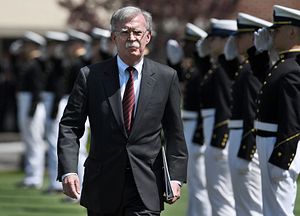John Bolton, it turns out, is still John Bolton.
U.S. President Donald J. Trump’s third national security adviser, who was sacked earlier in September, spoke on Monday at an event in Washington, D.C., on North Korea policy, revealing a deep rift between his views and that of the president he served less than three weeks ago.
Bolton began by offering an assessment of the North Korean leadership’s view of nuclear weapons in the country’s national strategy, saying that Pyongyang had no intention of relinquishing its nuclear arsenal. Without naming Trump, Bolton also said that brushing aside North Korea’s testing of short-range missiles — such those launched between May and early September this year — shows that the United States sees no value in the United Nations Security Council resolutions barring Pyongyang from testing those kinds of systems.
Bolton said that he believed sanctions relief continued to be North Korea’s overriding goal in negotiations. “He may try to get relief from international sanctions, he may try to get some concessions, but under current circumstances, he will never voluntarily give up his nuclear weapons,” he said. “I think right now we are in a classic standoff with North Korea… they want a piece of something that we should not be prepared to give them,” he added.
Revealing his most fundamental rift with the administration — and a view that analysts had long alleged he’d continued to hold — Bolton said that these facts should lead U.S. policymakers to consider a military solution to the problem of North Korea’s nuclear weapons. “There are things we should look to and have serious discussions about,” Bolton said. “One is the possibility of regime change in North Korea.
“Second, we should look at and discuss with China,” with the aim of working “towards the reunification of the peninsula under a freely-elected government in South Korea,” he continued. “And third, if you believe, and you may not, that it is unacceptable for North Korea to have nuclear weapons, at some point military force has to be an option.”
Bolton also referenced the 2003 disarmament of Libyan leader Colonel Muammar Gaddafi of a burgeoning nuclear program as a model for North Korea. Shortly after he joined the administration in 2018, Bolton publicly suggested the “Libya model,” leading to an angry riposte by Kim Kye Gwan, then the first vice minister of foreign affairs of North Korea. Kim warned that the United States should not compare North Korea, which had an advanced nuclear weapons capability, along with long-range missiles, to Libya, which had no nuclear warheads at the time of its disarmament.
Bolton’s remarks on Monday suggested that little had changed in his views from before he entered the Trump administration. Weeks before he was selected to succeed Lt. Gen. H.R. McMaster as Trump’s national security advisor, Bolton had expressed skepticism over the prospect of direct diplomacy between Trump and North Korean leader Kim Jong Un.
“[The purpose of this process is to] foreshorten the amount of time that we’re going to waste in negotiations that will never produce the result we want, which is Kim giving up his nuclear program,” Bolton said on a cable news show, suggesting that he sought the failure of diplomacy promptly. In February 2018, Bolton had authored a Wall Street Journal op-ed titled ‘The Legal Case for Striking North Korea First.’
Bolton and Trump were a mismatch on many thing when it came to foreign policy. North Korea may have been one of the largest such divergences between the two men.
































